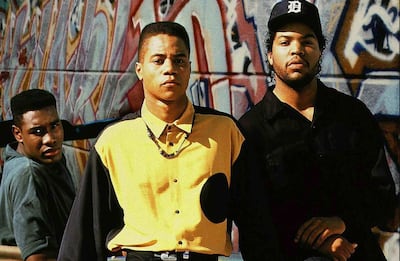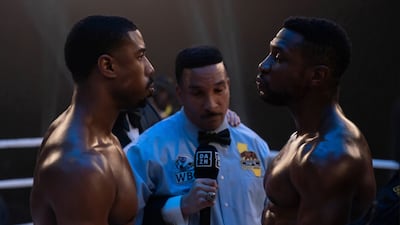Chick flick, romcom, weepie, date movie … the number of terms for films aimed at women are numerous and well-known.
But in the past few months, there has been a rise in awareness of the male equivalent of the traditional chick flick, the (often derogatory) term given to a film with an emotional resonance at its core that’s designed to provoke tears and big feelings in its audience.
Dubbed the “masculine melodrama” on social media — also known as the “male weepie” or “guy cry” — they are films that make men tear-up, and have been brought to the forefront of cinematic conversations with the release of Creed III, the third film in the Michael B Jordan-fronted Rocky spin-off franchise.
“As a man, you know, sometimes we’re taught that we can’t talk about those things and speak about our feelings as much,” Jordan told Variety of portraying Adonis Creed’s childhood trauma onscreen. “I want it to show a representation of what that looks like.
“Those moments don’t make you any less of a man; it doesn’t make you any less of a person to talk about how you feel and let that out.”
What makes a 'male weepie'?
Male-orientated tearjerkers are not a new phenomenon — a 1989 Time magazine review of the Kevin Costner baseball film, Field of Dreams, dubbed it “the male weepie at its wussiest” — it just took Gen Z to give the films a hashtagable rebrand.
In her 2014 thesis, From Buddy Film to Bromance: Masculinity and Male Melodrama Since 1969, film studies researcher Amy Jean Woodworth, noted: “Men’s tears are considered rare, and women's tears are considered profusive. Thus, we tend to think of tearjerkers and melodrama as the province of weepy women viewers.
“However, if we look back at the last several decades of Hollywood filmmaking, melodramas focused on men — or "male weepies" — have been a steady staple of American cinema.”
Woodworth cited the likes of 1969 Oscar winner Midnight Cowboy, 1991’s The Prince of Tides and 2006’s The Pursuit of Happyness as prime examples of “male melodramas”.
In 2016, the Independent’s film critic, Sarah Hughes dubbed the first Creed film “a genuine male weepie”.
Often sports or war-themed, guy-cry films are about male friendships and mentors, difficult family relationships, lost youth and fleeting moments of glory.
“Male weepies are often hyper masculine films in which a man has to do what a man has to do, usually while uttering as few words as possible,” Hughes wrote.
As Creed III continues to dominate at the box office, here are five masculine melodramas guaranteed to provoke a good old guy-cry…
Butch Cassidy and the Sundance Kid (1969)
Starring one of cinema’s most charismatic duos, Paul Newman and Robert Redford, male friendship is at the forefront of the Oscar-winning film.
The ultimate bromance between Cassidy and Kid put the focus firmly on trust, loyalty, shared dreams and never wavering in your support for your ride-or-die. The final scene remains one of the most famous in Hollywood history.
Field of Dreams (1989)
Field of Dreams’s poignant refrain, “If you build it, he will come,” remains one of the most recognisable lines in cinema.
After building a baseball diamond in his cornfield, Kevin Costner’s Ray Kinsella is visited by some of the greatest players in Major League Baseball history, happy to be able to play again in the afterlife.
The film’s themes of lost chances, regret, fatherhood and a man trying to provide for his family, ensure it remains a high point in the guy-cry oeuvre.
Boyz n the Hood (1991)

The title is a dead giveaway that this is a film about young men, and this early '90s classic received two Oscar nominations for its searing portrayal of black masculinity.
Set in the poverty-ridden LA neighbourhood of Crenshaw, the film starred Cuba Gooding Jr, Ice-T and Laurence Fishburne, and was critically acclaimed for its depiction of male friendships in the face of violent gang warfare.
A Perfect World (1993)
This masculine melodrama also stars Costner, a veritable king of the genre, alongside Matt Damon, and is directed by Clint Eastwood, who has made a career out of starring in and directing male-focused films.
The critically acclaimed crime drama shows Costner’s Robert Haynes bonding with his kidnap victim, aged eight, over their childhood trauma while on the run from the law. The ending is a high point of masculine sacrifice.
Gladiator (2000)
With a Paul Mescal-fronted sequel scheduled for release next year, any revisit of the original Gladiator is impossible without seeing it as a masculine melodrama.
Russell Crowe stars as the titular gladiator, Maximus Decimus Meridius, whose journey from general to slave to gladiator is a 155-minute long microcosm of the alpha male journey, pitting bravery and cowardice against each other, with only one possible winner.

